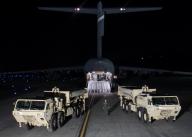
SEOUL (Reuters) – The United States started to deploy the first elements of its advanced anti-missile defence system in South Korea on Tuesday after North Korea’s test of four ballistic missiles, U.S. Pacific Command said, despite angry opposition from China.
The announcement came as North Korean state media said leader Kim Jong Un had personally supervised Monday’s missile launches by an army unit that is positioned to strike U.S. bases in Japan, stepping up threats against Washington as U.S. troops conduct joint military exercises with South Korea.
“Continued provocative actions by North Korea, to include yesterday’s launch of multiple missiles, only confirm the prudence of our alliance decision last year to deploy THAAD to South Korea,” U.S. Pacific Commander Admiral Harry Harris said in a statement, referring to the Terminal High Altitude Area Defense (THAAD) anti-missile system.
The move by the U.S. military is likely to deepen the brewing conflict between South Korea and China, which says the THAAD deployment destroys the regional security balance.
The four ballistic missiles fired by North Korea landed in the sea off Japan’s northwest, angering Seoul and Tokyo, days after Pyongyang promised retaliation over the military drills that it sees as preparation for war.
U.S. President Donald Trump and Japanese Prime Minister Shinzo Abe discussed the launches by the nuclear-armed North during a phone call on Tuesday.
“Japan and the U.S. confirmed that the latest North Korean missile launches were clearly against U.N. resolutions and a clear provocation against the regional and international community,” Abe told reporters. “(North Korea’s) threat has entered a new phase.”
Trump also spoke to South Korea’s acting President Hwang Kyo-ahn to discuss the North’s missile launches, Hwang’s office said. Continued…












